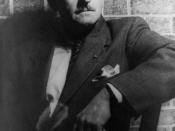Upon coming of age, a young man will face an internal struggle between what he feels is the "right" thing to do and what society expects. The two stories, "Barn Burning" by William Faulkner and "A&P" by John Updike, thematically represent these struggles through their main characters, Sarty and Sammy respectively. Although these two stories differ in setting and character, Sarty and Sammy are required to make a decision which will affect the rest of their lives; they inevitably make a heroic life decision and step out of the constraints of what is expected and do what they feel is right.
Sarty, in the "Barn Burning", is a ten-year-old boy living in a rural setting of the 1890s; he is entering a new stage in his life. His father, Abner, is pressuring him to do what is expected of being a male member of the Snopes family and Sarty is struggling with the dilemma of doing what is expected by his father and what he feels he should do: "He [Abner] aims for me to lie, he thought, again with that frantic grief and despair.
And I will have to do hit." (Faulkner 398). The grief and despair Sarty is feeling attests to the fact he really does not want to lie and reluctantly feels he will have to lie because of the expectations of his father. Abner expects compliance. If Sarty does not do what is expected, he will be hit. Abner is teaching Sarty his role: "His father struck him with the flat of his hand on the side of the head, hard but without heat, exactly as he had struck the two mules...You're getting to be a man. You got to learn. You got to learn to stick to your own blood or you ain't going...


